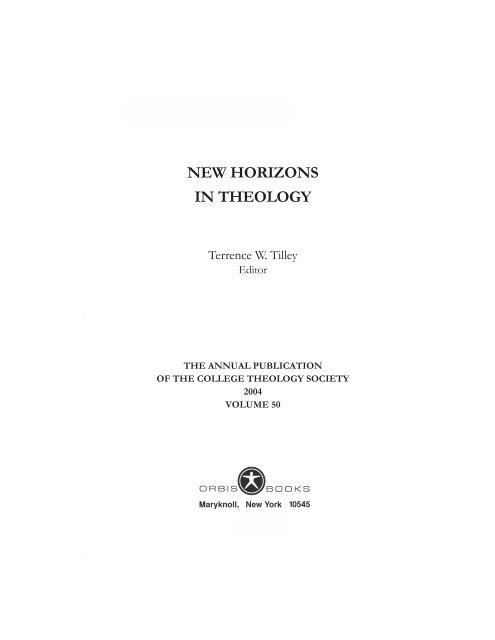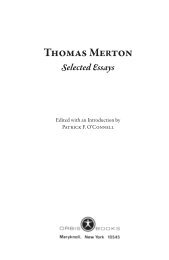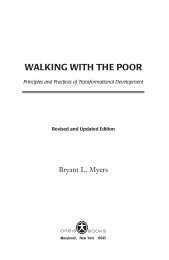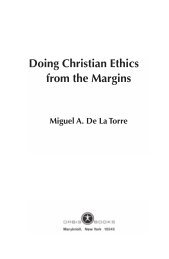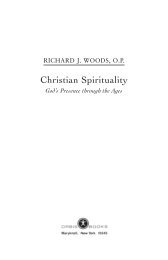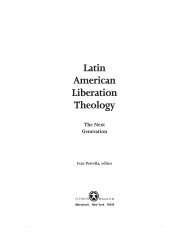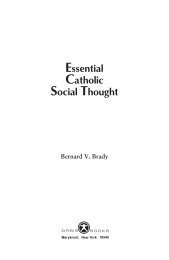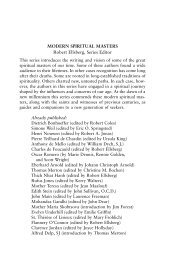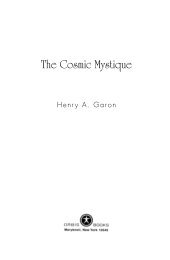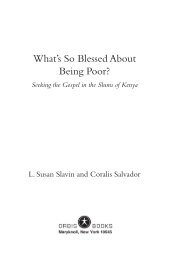NEW HORIZONS IN THEOLOGY - Orbis Books
NEW HORIZONS IN THEOLOGY - Orbis Books
NEW HORIZONS IN THEOLOGY - Orbis Books
Create successful ePaper yourself
Turn your PDF publications into a flip-book with our unique Google optimized e-Paper software.
<strong>HORIZONS</strong> OF <strong>THEOLOGY</strong>5neo-Thomist, feminist/womanist/mujerista, liberation, ecological,postliberal, and postmodern constructs, along with interreligious dialogue,now make pluralism in theology seem entirely normal.These shifts in the academic social location of theology have happenedin a church itself undergoing major transitions due to the SecondVatican Council. This Society was not even a decade old whenthe Council began, and most of its history has been interwoven withthe reception of the Council and its reverberating effects. The pictureis complicated, with a conflict of interpretations over what the Councilactually meant, and with the current effort of the highest ecclesiasticalauthorities to restore one interpretation over all.Out of these swirling currents in academy and church is emerging,I wager, a distinctive American voice, or better, voices, in theology. In1979 Karl Rahner, responding to an honorary degree awarded himat Marquette University, memorably envisioned the future of theology.He said:I am thinking of a theology which can no longer be uniformin a neo-scholastic approach. . . . I envisage a theology whichin the Church at large must be the theology of a worldwideChurch. That means a theology which does not only recite itsown medieval history, but one that can listen to the wisdomof the East, the longing for freedom in Latin America, and alsoto the sound of African drums. 3Notice what is missing geographically: any mention of theology dancingto an American beat. At that point in time, most North Americantheologians were still absorbing the wisdom of European theologianswho had pioneered the breakthroughs of the Second Vatican Council,including that of Rahner himself. We might say that theology inthis country had a German voice—Barth, Bonhoeffer, Pannenberg,Moltmann, Balthasar, Rahner, Metz, Küng, Kasper—although someFrench like de Lubac and Congar, and some Flemish or Dutch likeSchillebeeckx and Schoonenberg varied the accent. But that wastwenty-five years ago.Since then there has been rapid maturing of the community ofbiblical, historical, foundational, systematic, and moral theologiansin this country. In terms of numbers, there are now close to twothousand academically trained people teaching, researching, andwriting Catholic religious scholarship across this country, a critical
6ELIZABETH A. JOHNSONmass unmatched in any other country on earth. This is largely due toour system of higher education, which requires professors in greatnumbers. In terms of practitioners, for the first time in history themajority of this critical mass of credentialed teacher-scholars is composedof women and men who have not been through seminary training,who may well be married, with children and other commitmentsin society, and who bring a distinctively lay experience into the profession.This number includes people (not yet enough) of differentraces and ethnic communities, whose voices contribute insight thatenhances the pluralistic picture.All of this brings precision to the idea that a new voice to notice atthis Jubilee is theology done in an emerging, genuine, diverse Americanidiom. It is not a Roman voice, not a German voice, not someoneelse’s voice, but our voice and we need to claim it. Remember thatChristian theology’s two-thousand-year history of development showsnot only that theology inevitably takes on cultural forms. It also makesclear that theology works best when fertilized by the philosophicalassumptions, patterns of thought, and pressing questions of its owntime and place, and when energized by the dynamic moral resourcesof the Christian tradition to challenge violations of the gospel occurringin its own culture. Utilizing the lived experience that this Americanlife provides for understanding faith, we are already newly engagedin “naming grace,” in Mary Catherine Hilkert’s beautiful term,and in the process “inventing Catholic tradition,” in Terrence Tilley’sprovocative phrase. 4 It is a sign of the growing maturity of the churchcommunity in this country that it can generate such reflection, and asign of the hunger of so many adults for a mature faith that this workis being so well received.One hundred years from now, how will historians describe thecharacteristics of theology done in American voices? If the past isprologue, let it be noted that the first time the American experienceaffected universal church teaching was when John CourtneyMurray’s work on religious freedom and the value of separation ofchurch and state flowed into the conciliar document Dignitatishumanae, on the dignity of the human person, which requires thatthe exercise of religion in society be free. I suggest that the experienceof living in a pluralistic, more or less democratic society repletewith American philosophical and cultural resources, alongwith efforts to be self-critical of the consumerist, selfishly narrow,violent, and amnesiac streams in our own culture, will bear fruit in
<strong>HORIZONS</strong> OF <strong>THEOLOGY</strong>7ways yet to be envisioned that will benefit the world church.But there is ever so much more involved. We live today in oneworld where national borders do not limit consciousness; a worldwhere beautiful advances in human dignity interact with gross violationsof human rights; a world where immense striving seems to putonly a dent in flagrant inequity and poverty; a world where heroicefforts for peace have not ended violence, terror, and war; a worldwhere growing ecological consciousness co-exists with species extinctionand the natural world itself under threat. If theology done inan American voice does not responsibly heed the voices arising fromthese concerns, both at home and abroad, it will end up as little morethan elegant frittering.Global VoicesConsider, then, the wider world, marked by an interdependencethat is entirely new in history. Globalization is the term that pinpointsthe increasingly interconnected character of political, economic,and social life of the peoples on this planet. To cite key examples: theworld-wide expansion of market capitalism is creating a single worldeconomy, now reigning almost everywhere, with dramatically differenteffects on rich and poor nations; technology such as the Internetcompresses time and space, enabling the rapid global transfer of ideasand information beyond the ability of any hierarchy, civil or religious,to control it; the migration of millions fleeing war and povertymixes peoples together at an unprecedented rate, so that multiculturalexperience is to be had practically everywhere. Nineteen-fifty-fourseems a long, long time ago, not only in the academy and in thechurch, but also in the world.In his book The New Catholicity, Robert Schreiter proposes thatthese changes have produced “global information flows,” that is,circulations of insight across geographical and cultural boundariesthat change every local landscape. Commensurate with this, theologyeverywhere in our day is also affected by global currents thatspread beyond their point of origin to address issues that affect everyone.5 Theological discourse in the world church is increasinglyinterlinked, for example, by liberation, feminist, and human rightsconcerns. Insofar as these flows carry a holistic vision of what isessential for life’s flourishing, along with protest against how this isbeing violated, they form a chorus of new voices crying out for the
8ELIZABETH A. JOHNSONreign of God. From the many sources of new religious insight, takenote of at least four.Voices of the PoorThe struggle for life waged by billions of economically poor peoplehas given rise to liberation theologies on various continents. There isdeep wisdom here, arising from the underside of history, about divinecompassion and the liberating way God acts with the world asrevealed in Jesus Christ. Partnering this wisdom is a challenge toconscience. This voice calls us well-off theologians, who have enoughto eat, to listen to the voiceless hungry people of the world, strugglingthrough short lives of immense misery. It calls us to attend tothe quiet, searing pain of the dying poor. Making a preferential optionfor the poor, taking their side, brings into view the sufferingcaused by the devastation of war and by structurally unjust economicpolicies, for example, transnational corporations that are not accountableto the people affected by their policies but seek mainly to maximizeprofit for their own shareholders. Hearing these voices causestheology to reflect in a way that will challenge oppression and promotethe justice that benefits the disenfranchised.Voices of WomenThe struggle for women’s equal human dignity has taken on distinctivetheological shapes among women with diverse racial, ethnic,class, and cultural identities, as the adjectives feminist, womanist,and mujerista indicate. There is deep wisdom here, arising fromwomen’s religious experience, about divine compassion and the liberatingway God acts with the world as revealed in Jesus Christ.Partnering this wisdom is a challenge to conscience. Many aspects ofsociety and religion are structured according to the norms of patriarchy.The majority of the world’s women still lack goods that Westernwomen take for granted: access to basic education, nutrition, andhealth care, the right to consent to marriage and to sexual acts, theright to own property and to legal protection from domestic violence.Defined by their feminine nature as a breed of human beingsdifferent from men, women in the church are barred from sacramentalministry and governance of the community and directed to secondaryresources for their spirituality. Hearing these voices calls theol-
<strong>HORIZONS</strong> OF <strong>THEOLOGY</strong>9ogy to promote the human flourishing of all women in every systemicdimension of life because women, too, are beloved of God.Voices of Black, Hispanic, and Asian PeoplesThe struggle for equality by communities in this country whoseracial or ethnic heritage differs from mainstream Euro-Americans isgiving rise to new theologies coherent with each group’s history. Thereis deep wisdom here, drawn from resistance to slavery, lynchings,and discrimination, and drawn from popular religious practices inthe home and neighborhood, about divine compassion and the liberatingway God acts with the world as revealed in Jesus Christ.Partnering this wisdom is a challenge to conscience. Made invisibleor cast as “Other” by the racism of traditional theology, minoritygroups today still wrestle with the exclusion dictated by the prejudiceof the white majority. Hearing these voices calls theology to promoteinclusion of all peoples in the promise of the reign of God, in boththought and practice.Voices of World Religious TraditionsEncounters with people of the world’s religions enhanced by interreligiousdialogue are giving rise to a sea-change in the way the Christianchurch views other religions and itself in relation to them. Thereis deep wisdom here, about divine compassion and the liberatingway God acts with the world as revealed in religious paths beyondthe historical following of Jesus Christ. Partnering this wisdom is achallenge to conscience. The devotion of adherents of the world’sreligious traditions shows Christians that while in Jesus Christ, crucifiedand risen, we have a unique encounter with the incarnate God’sways in the world, we do not have a monopoly on either truth orholiness. Hearing these voices causes theology to try to “get right”the Holocaust and build a relationship with the Jewish peoplegrounded, finally, in mutual respect. Stretching us even further, thesevoices call theology to attend to what God has been up to in thetraditions that address the God of Abraham, Sarah, and Hagar, theGod of Jesus and Mary Magdalene, as Krishna, Buddha, and Allah.Watered by these global theological flows, the work of trying to“name the grace” of God’s presence in this global era and not some
10ELIZABETH A. JOHNSONother moves theology beyond parochial horizons and narrow interests.Circling back to the earlier question of what characterizes theologydone in a distinctive American idiom, it now becomes clear thatattending to these previously unheard voices is essential for the vitalityof any long-term contribution. Though these voices may create ataxing dissonance with traditional stances, doing justice to them mustbe part of our normal practice as we research, write, read, and teachtheology. Blocking them out would undermine the very service theologyintends to render, starting with service to the American Catholiccommunity itself.Here is a Jubilee hope: that a North American theology will comeforth that is a genuine contribution to the conversation emergingfrom these new global flows because it remembers and serves thoseoutside our own privileged circles. Steeped in a love of freedom, thistheology would be intelligible, credible, flexibly normative, full ofaffirmation, and adequate to praxis and to ritual (for “a traditionthat is not celebrated is dying”) precisely by listening generously tothe voices of those who demand of us a new mode of working andrelating to them. Such a theology, as it affects our local church throughteaching and preaching, would light the way to meaning at the sametime that it challenged the conscience of those who have more thanthey realize. Such a theology in an American voice would be worthits weight in gold.There is yet another voice to be heard, one that calls our thoughtand care beyond the human race to consider the entire community oflife with whom we share this planet as a matter of faith and ethics.The Voice of the EarthAt the start of this third millennium, a new awareness of the magnificenceof life on planet Earth is growing among peoples everywhere—anothersign of globalization. We have seen the image ofEarth from space, a blue marble swirled around with white clouds,the only spot of life in a vast black sea of space. Contemporary sciencehas taught us about the origin of the universe in the unimaginableBig Bang some fourteen billion years ago; and about the formationof our sun and planet from an exploding star; and about theflaring forth of life in the ancient seas; and its evolution from singlecelledto multiple-celled creatures, and from plant to animal life, includinghomo sapiens, we human mammals whose brains are so richly
<strong>HORIZONS</strong> OF <strong>THEOLOGY</strong>11complex that we enjoy self-reflective consciousness and freedom. Thisnew cosmology makes clear that humans are part and parcel of theenvelope of life on this planet, true earthlings, who share geneticancestry and the material of existence with all other creatures on theplanet.The present moment is marked by a strange paradox. While wegrow in wonder at life on this planet, we are at the same time engagedin death-dealing actions that ravage and deplete, even wipeout, the natural world. Two major engines of destruction are overconsumptionand overpopulation. Every year, 20 percent of Earth’speople in the rich nations use 75 percent of the world’s resources andproduce 80 percent of the world’s waste. An example: Chicago withthree million people consumes as much raw material in a year asBangladesh with ninety-seven million people. Such over-consumptionis driven by a consumer economy that must constantly grow inorder to be viable, one whose greatest goal is a bottom line in theblack. It does not factor in the ecological cost. Simultaneously, humannumbers multiply exponentially. In 1950 the world numberedtwo billion people; at the turn of the millennium, six billion. Currentprojections envision that by the year 2030 there will be ten billionpersons on the planet. Earth’s human population will have multipliedfive times during the average lifetime of a Westerner born in1950. To translate these statistics into a vivid image: another MexicoCity is added every sixty days; another Brazil is added every year.The capacity of the planet to carry life is being exhausted by thesehuman habits. Not only is our species gobbling up resources fasterthan Earth’s ability to replenish itself, but our practices are causingdamage to the very systems that sustain life itself: holes in the ozonelayer, polluted air, acid rain, clear-cut forests, drained wetlands, denudedsoils, poisoned rivers and lakes, fouled patches of ocean.Appallingly, this widespread destruction of habitats has as its flipside the death of creatures that thrive in these ecosystems. By a conservativeestimate, in the last quarter of the twentieth century, at least10 percent of all living species have gone extinct. When these creatures,these magnificent plants and animals, large and small, go extinct,they never come back again. We are killing birth itself, wipingout the future of fellow creatures who took millions of years to evolve.A moral universe limited to the human community no longer servesthe future of life. Countering the sins of ecocide, biocide, and geocide,theology must listen to the voice of the Earth and take action on
12ELIZABETH A. JOHNSONbehalf of the natural world, even if this goes counter to powerfuleconomic and political interests—and it does. In 1990, Pope JohnPaul II offered a radical principle: “Respect for life and for the dignityof the human person extends also to the rest of creation.” 6 Weowe love and justice, in other words, not only to humankind but alsoto “otherkind.” In such ethical reflection, the great commandment tolove your neighbor as yourself extends to include all members of thelife community. “Save the rain forest” becomes a concrete moral applicationof the commandment, “Thou shalt not kill.” This in turnrequires us to probe the deep connections between social injusticeand ecological devastation, laying bare how ravaging the land andexploiting the poor go hand in hand. Whether or not theology contributesto a sustainable Earth community is now a matter of life anddeath.Doing theology with an ear attuned to the voice of the Earth requiresthat theology dive deep and find love for the Earth at the verycore of Christian faith.Think of creation: In the beginning God created the heavens andthe earth, and pronounced everything good. But God did not justcreate the world and then depart. The Spirit of God, who moved overthe original chaos to bring forth the world, continues to dwell withinthe world, vivifying it, even renewing the face of the Earth. The Earth,it is clear, is the Lord’s with all its fullness (Ps 24:1). In Jewish andChristian tradition, the truth of the world is this inner dwelling of theSpirit of God within it. To craft an a-cosmic theology of God is to beignorant of the divine relationship of transcendent immanence.Think of incarnation: This same creative Spirit of God overshadoweda young girl in the poor, peasant community of Nazareth. TheWord became flesh and dwelt among us! What else does this meanbut that God is no longer satisfied to be with us in Word and Spiritonly, but becomes one of us in the flesh. The material of this Earth,coalesced from an exploding star and evolved through eons of deeptime into life and the human species, becomes God’s own body presentin history. From now on, God in the flesh becomes part of the historyof this cosmos.Think of resurrection: By the power of the Creator Spirit, the crucifiedJesus died not into nothing, but into the hands of the livingGod. God had the last word, and it was the same as the first: Letthere be life! Death now has no more dominion, for his destiny is apledge of the future for the rest of us. This has cosmic significance. As
<strong>HORIZONS</strong> OF <strong>THEOLOGY</strong>13Karl Rahner preached in a homily on Easter as the feast of the futureof the earth, in Christ risen a piece of this earth, real to the core, isnow forever with God in glory. “His resurrection is like the firsteruption of a volcano which shows that in the interior of the worldGod’s fire is already burning, and this will bring everything to blessednessin its light. He has risen to show that it has already begun.” 7The future will be on a cosmic scale what has already happened tohim.I rehearse these Christian doctrines, among others, because theyhold powerful implications for the meaning of the natural world in afaith context. They coalesce in the view that the world is a sacrament,a tangible, material being vivified by the living Spirit, “chargedwith the grandeur of God,” as Gerard Manley Hopkins put it. 8 Seenin this light, the value of creation, now under duress, becomes anintrinsic part of Christian belief, not something added on. And thepractice of virtue, which in Christian teaching has always called forlove of neighbor and resistance to harm, broadens to include thewhole community of life and the ecosystems that make life possibleon this planet. A flourishing humanity on a thriving Earth in an evolvinguniverse, all together filled with the glory of God: such is theglobal vision and praxis theology must work for in this critical age ofEarth’s distress. Only thus will people be encouraged to become partnersrather than unwitting destroyers of the great ongoing saga oflife.ConclusionThe multiple voices emerging in our own society and around theworld require tending. Being new, in some cases fragile, tentative,challenging, perhaps filled with anguish, they may tempt us to shutour ears. Such voices require, in Nelle Morton’s famous phrase, thatwe “hear each other into speech.” 9 Even attempting to do this opensup new horizons for our theological work. “Horizons” is a wonderfulmetaphor. The horizon surrounds us all the time, but even in thefastest plane we can never catch it. Moving toward the horizon,though, opens up previously unseen vistas, rich understandings ofGod and God’s gracious ways with the world that bear fruit in lovingpraxis.I feel a passionate urgency about the need for theology to engagethe real questions of our day. Studying the history of religions, the
14ELIZABETH A. JOHNSONGerman theologian Wolfhart Pannenberg was struck by how manyof the religions of the past have disappeared. Who worships Jupiterany more, or Athena or Ra or Baal and Ashtarte? Probing for reasonswhy, he coined a memorable axiom: Religions die when theirlights fail, that is, when they lose their power to convince. 10 Historyis dynamic. In every generation, people have new experiences. If thegod they believe in cannot keep up with this ongoing experience, ifsuch a deity cannot unlock a meaningful life in this new context, thenpeople eventually lose heart and let go of the old religious pattern,seeking elsewhere for something that makes more sense. Pannenbergsees the early Christian theological shift from Hebrew to Hellenisticcategories as profound evidence that the God of Jesus Christ is thetrue God who, as Lord of history, can keep pace with the currenthistorical experience of the community.I put this question to the College Theology Society as a challengefor the next fifty years: Is the God of Jesus Christ so true as to be ableto keep pace with twenty-first-century experiences of people inpostmodern American society; with the struggles of the materiallydisenfranchised, of women, of racial and ethnic minorities; with theappreciation of other great religious traditions; with the awakeningof ecological care? If not, Christianity will fade away. If yes, it is thework of theology to show how this is the case.My wager is that we are up to the task. May it be so.Notes1See Sandra Yocum Mize, “On Writing a History of the College TheologySociety,” Horizons: Journal of the College Theology Society 31/1 (Spring2004): 94-104.2Bernard Cooke, “Retreat and Advance” (Twenty-Fifth AnniversaryEssays), Horizons: Journal of the College Theology Society 26/2 (Fall 1999):276-78; quotation at 277.3Karl Rahner, “Foreword,” Theology and Discovery: Essays in Honor ofKarl Rahner, S.J., ed. William Kelly, S.J. (Milwaukee: Marquette UniversityPress, 1980), vii.4Mary Catherine Hilkert, Naming Grace: Preaching and the SacramentalImagination (New York: Continuum, 1997); Terrence W. Tilley, InventingCatholic Tradition (Maryknoll, N.Y.: <strong>Orbis</strong> <strong>Books</strong>, 2000).5Robert J. Schreiter, The New Catholicity: Theology between the Globaland the Local (Maryknoll, N.Y.: <strong>Orbis</strong> <strong>Books</strong>, 1997), 15.6John Paul II, “The Ecological Crisis: A Common Responsibility,” And
<strong>HORIZONS</strong> OF <strong>THEOLOGY</strong>15God Saw That It Was Good: Catholic Theology and the Environment, ed.Drew Christiansen and Walter Grazer (Washington, D.C.: U.S. CatholicConference, 1996), 222.7Karl Rahner, “Easter: A Faith That Loves the Earth,” The Great ChurchYear, ed. Albert Raffelt (New York: Crossroad, 2001), 192-97.8Gerard Manley Hopkins, “God’s Grandeur,” A Hopkins Reader, ed.John Pick (Garden City: Doubleday, 1966), 47.9Nelle Morton, The Journey Is Home (Boston: Beacon, 1985), 128.10Wolfhart Pannenberg, “Toward a Theology of the History of Religions,”in his Basic Questions in Theology, vol. II (Philadelphia: Fortress,1971): 65-118.


